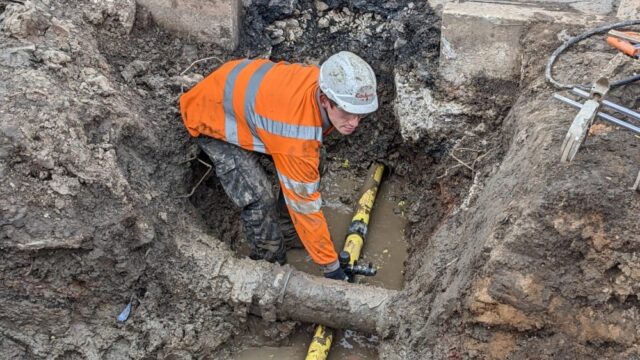While summer may be on the way, Cadent in the East of England is planning for colder conditions to ensure that residents have access to heat and hot water no matter what the weather.
Cadent has confirmed investment of more than £91million to modernise over 300km of its East of England pipeline over the next 12 months (April 2025 to March 2026).
This is around the same straight-line distance as Newmarket to Amsterdam, or the length of 1,200 Britannia Piers, or the height of more than 3,333 Norwich Cathedrals.
The work will be delivered by skilled engineers as they replace ageing metallic pipes – many over 100 years old – with new plastic ones which will futureproof the network and allow gas to keep flowing.
Upgrading the East of England network means 1.6million properties will receive a safe and reliable gas supply for many years to come.
Homes, schools, hospitals and other buildings use gas for heat and hot water, some of the region’s biggest industries need it to power production processes, and it is the fuel of choice for a rising number of HGV fleets.
“We are very aware that the majority of homes across the East of England rely on gas for central heating and it’s our job to make sure they get it, safely and reliably, throughout the year,” said Head of Investment Delivery Kerry Stimson, who leads the team delivering Cadent’s gas mains upgrade work in the region.
“Metallic gas pipes have a safe working life and as they reach the end of that, it is our responsibility to replace them.
“There are also big environmental gains for the region as part of these upgrades as it reduces methane emissions and enables a move to more renewable gases like biomethane. This is essential for a cleaner future – the UK will need energy to come from a range of sources to meet demand and be sustainable.”
The work is part of a 30-year programme, which started in 2002, to upgrade the entire UK gas network.
Every year, Cadent is responsible for the upkeep and safe working of around 23,000km of pipes in the East of England, which are mostly underneath the region’s roads. When needed, this includes replacing ageing or severely damaged pipes.
Kerry added: “In most cases we can insert the new plastic pipe into the old metallic one. This technique reduces the time of each project, and we don’t have to dig as much, which means less disruption for local communities.
“The upgrades also mean an end to what can often become return visits – with associated disruption – to repair faults on the older metallic mains, as they start to show signs of age.
“We know roadworks aren’t ideal, but my team is determined to move as quickly as they safely can and get the work done with as little disruption as possible.”
By distance, the ‘top five’ workload areas for 2025-26 are: Broadland (37,827 metres), Waveney (25472 metres), Breckland (22,831 metres), North Hertfordshire (21,778 metres), and Three Rivers (18252 metres).
You will find the figures for each of the East of England’s local authority areas in the table below.
Metres of pipe to be upgraded in 2025-26, by local authority area (rounded to nearest metre):
Babergh
12158
Bedford
2223
Braintree
17120
Breckland
22831
Broadland
37827
Broxbourne
11504
Cambridge
10924
Central Bedfordshire
2211
Chelmsford
2440
Chiltern
885
Colchester
99
Dacorum
1942
Enfield
813
Epping Forest
8111
Fenland
6374
Forest Heath
7579
Great Yarmouth
27
Harlow
5432
Hertsmere
8257
Huntingdonshire
6574
Ipswich
2081
King’s Lynn and West Norfolk
5059
Luton
9566
Maldon
970
Mid Suffolk
715
Norfolk
316
North Hertfordshire
21778
North Norfolk
9191
South Bedfordshire
2667
South Cambridgeshire
903
South Norfolk
751
St Albans
206
St Edmundsbury
5790
Stevenage
3446
Suffolk Coastal
6486
Tendring
10276
Three Rivers
18252
Uttlesford
5867
Watford
6042
Waveney
25472
Welwyn/Hatfield
394
How the work is planned and delivered
Cadent works with the local highways authorities to agree the best and least disruptive timings to carry out these essential upgrades. It will also collaborate with other utilities, to find opportunities to work together in the same set of roadworks. Once start dates have been confirmed, letters are sent to properties impacted ahead of the work starting.
Part of the programme also involves replacing individual ‘service’ pipes of tens of thousands of properties at no extra cost for customers. Cadent makes all the arrangements and gives advance notice of when work will happen.
Gas remains on throughout, although in some cases properties that take a direct feed from the pipe being replaced will lose supply for up to 12 hours, as their building is connected to the new main. Customer teams are on hand to answer questions and support customers – particularly those on the Priority Services Register.




